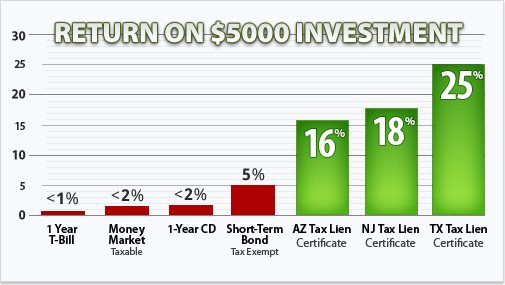All Categories
Featured
Table of Contents

There is a three year redemption period for the majority of properties sold at the tax obligation lien sale and during that time, the residential or commercial property still belongs to the analyzed owner. Very few property tax obligation liens in fact go to act.
The rates of interest on tax obligations purchased at the tax lien sale is 9 percent factors over the discount rate paid to the Reserve bank on September 1st. The rate on your certificate will remain the same for as lengthy as you hold that certificate. The rate of return for certifications sold in 2024 will be fourteen percent.

The certifications will be kept in the treasurer's workplace for safekeeping unless otherwise instructed. If the tax obligations for taking place years come to be overdue, you will certainly be notified around July and provided the chance to recommend the tax obligations to the certificates that you hold. You will obtain the very same rate of interest on subsequent taxes as on the original certificate.
The redemption duration is three years from the day of the initial tax obligation sale. You will get a 1099 type showing the quantity of redemption rate of interest paid to you, and a duplicate will certainly also be sent out to the IRS.
Spending in tax liens and deeds has the prospective to be fairly lucrative. It is also feasible to purchase tax liens and deeds with less funding than may be required for various other investments such as rental homes. This is one of the a lot more popular financial investment choices for holders of Self-Directed Individual Retirement Account LLC and Solo 401(k) programs.
Tax Lien Investing Crash Course
Tax obligation liens may be levied on any type of type of property, from raw land to homes to commercial homes. The rules bordering the kind of lien and exactly how such liens are provided and retrieved differs by state and by area. There are two main courses, tax liens and tax deeds. A tax lien is provided promptly once they homeowner has stopped working to pay their taxes.

Such liens are after that marketed to the general public. A capitalist acquisitions the lien, thus giving the municipality with the necessary tax earnings, and afterwards can the residential property. If the home owner pays their tax obligations, the capitalist usually receives rate of interest which can be in the variety of 12-18%.
Tax obligation liens and deeds offer the opportunity for charitable return on financial investment, possibly with lower amounts of capital. Tax lien investing is focused on the collection of interest and penalties (where readily available) for the tax obligation financial obligation.
The procedure for spending varies by state and by region. The majority of liens and deeds are cost auction, with some auctions occurring in-person at a region court house, and some occurring online. You will usually need to register ahead of time for such auctions and might be called for to put a down payment to get involved.
Is Tax Lien Investing Profitable
In some territories, unsold liens or actions might be readily available available for sale "over-the-counter" from the region staff's office or web site after an auction has been finished. Prior to taking part in a public auction, you will want to execute research to determine those properties you might be interested in and ensure there are no problems such as other liens that may need to be resolved or issues with the property itself that may develop problems if you were to take over possession.

This may require the issuance of a cashier's check or cable from your plan account. You will certainly after that need to wait out any type of redemption duration as permitted by law. This period is indicated to offer the residential or commercial property proprietor an opportunity to settle their financial obligation with the taxing authority. With a lien, redemption means that your individual retirement account or 401(k) will obtain a cash advance, with interest and any kind of appropriate charges being paid.
Tax lien and act investing is an area where checkbook control is a must. You require to be able to issue funds directly on short notification, both for a deposit which must be registered in the strategy entity name, and if you are the winning prospective buyer. With a Checkbook Individual Retirement Account LLC or Solo 401(k), you can directly make such settlements from your plan account without hold-ups or 3rd event charges.
If you make a down payment and are not successful in bidding process at auction, the deposit can just be returned to the plan account without headache. The several days refining delay that includes working straight through a self-directed individual retirement account custodian simply does not operate in this area. When purchasing tax obligation liens and actions, you should ensure that all tasks are performed under the umbrella of your strategy.
All costs associated with tax obligation lien investing need to come from the strategy account straight, as all income generated need to be transferred to the plan account. how to invest in tax lien certificates. We are typically asked if the plan can pay for the account holder to go to a tax lien training course, and suggest versus that. Even if your investing tasks will be 100% via your plan and not include any type of personal investing in tax obligation liens, the internal revenue service could consider this self-dealing
Are Tax Liens Good Investments
This would certainly also hold true of acquiring a property using a tax deed and after that holding that residential property as a service. If your technique will involve acquiring homes merely to turn around and re-sell those residential properties with or without rehabilitation that could be considered as a dealer activity. If executed regularly, this would certainly subject the individual retirement account or Solo 401(k) to UBIT.
As with any kind of investment, there is risk connected with buying tax liens and acts. Investors must have the monetary experience to evaluate and recognize the risks, carry out the required persistance, and correctly administer such financial investments in conformity internal revenue service policies. Guard Advisors, LLC is not a financial investment advisor or carrier, and does not recommend any specific financial investment.

The information over is instructional in nature, and is not meant to be, neither needs to it be interpreted as giving tax obligation, legal or investment advice.
Investing In Tax Lien Certificate
Lien imposed on property by law to safeguard payment of taxes Pima Area, Arizona delinquent real estate tax list for public auction by the County Treasurer A tax lien is a lien which is enforced upon a residential or commercial property by regulation in order to safeguard the settlement of taxes. A tax lien may be enforced for the purpose of collecting overdue tax obligations which are owed on real estate or personal effects, or it may be enforced as a result of a failing to pay earnings tax obligations or it might be enforced as an outcome of a failure to pay other taxes.
Internal Earnings Code section 6321 supplies: Sec. 6321. LIEN FOR TAX OBLIGATIONS. If anybody liable to pay any tax forgets or declines to pay the same after need, the quantity (consisting of any type of rate of interest, added quantity, enhancement to tax, or assessable charge, together with any kind of expenses that might build up additionally thereto) will be a lien for the United States upon all property and civil liberties to residential property, whether genuine or individual, coming from such individual.
Real Estate Tax Lien Investments For Tax Advantaged Returns

Department of the Treasury). Generally, the "individual liable to pay any type of tax obligation" described in area 6321 should pay the tax obligation within 10 days of the created notification and demand. If the taxpayer stops working to pay the tax obligation within the ten-day duration, the tax obligation lien occurs immediately (i.e., by procedure of regulation), and is efficient retroactively to (i.e., occurs at) the day of the evaluation, although the ten-day period necessarily runs out after the assessment date.
A federal tax obligation lien arising by law as explained above stands against the taxpayer with no additional action by the government. The general guideline is that where two or even more lenders have completing liens versus the exact same building, the financial institution whose lien was perfected at the earlier time takes top priority over the creditor whose lien was improved at a later time (there are exemptions to this rule).
Table of Contents
Latest Posts
Nys Tax Foreclosures
Tax Liens Foreclosures
Is Investing In Tax Liens A Good Idea
More
Latest Posts
Nys Tax Foreclosures
Tax Liens Foreclosures
Is Investing In Tax Liens A Good Idea